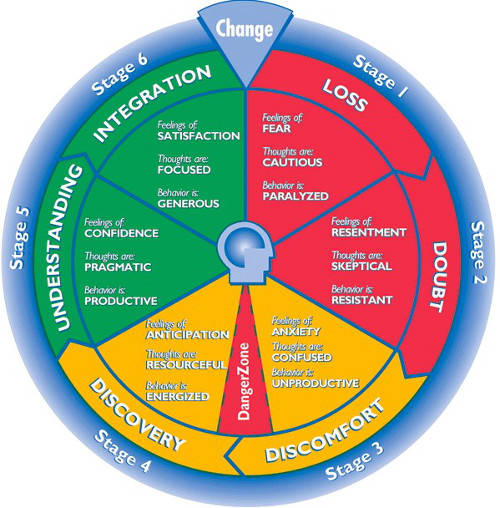|
The winds of change are upon us. It’s a new year. A fresh start. There are new challenges to be faced and embraced… for we can always rely on change – good and bad - to happen to us.
There are three important things to remember about change:
- It will always happen – what is important to know, is which stage of change you are currently in.
- No matter how negative you perceive the change to be, there is always room for positive growth and learning.
- No matter how positive you perceive the change to be, it is always stressful.
While we cannot always control the changes in our lives, we can decide how we are going to react to those changes, so that we emerge as victors and not victims. So what do we need to learn to help us embrace change? First, it’s helpful to understand the impact of change and second, it’s useful to understand the stages of change.
What is the impact of change?
- Change is about letting go.
- Change implies a loss of control. You need to let go of the comfortable and current 'winning recipe'. We need to stop being comforted by the illusion that things will always be the same – today and in the future.
- Change often implies a temporary dip in performance. The challenge is to minimise this impact.
- Change is a process, not an event.
- What works today will not necessarily work tomorrow.
- You must let go of where you are to get where you are going.
- Behaviours that demonstrate adaptability include the ability to:
- Let go of assumptions
- Tolerate uncertainty
- Risk a new way of doing things
- Be flexible
- Take into account the multiple perspectives of a situation
- Understand the “why” of change.
For more information about the impact of beliefs on the experience of change, please read my article: The Challenge of Change.
The Stages of Change
Think of changes that have occurred in your life – moving house, changing schools or jobs, the village you grew up in changing and expanding, road names changing, the introduction of new technology (typewriters changing to computers, records to CDs to DVDs to MP3 etc.) and social media innovations.
Do you like these changes? Did you embrace them straight away?
There are six different stages we all go through in response to change. The Change Wheel below shows us the six different stages and gives us an idea of the thoughts, feelings and behaviour we can expect at each stage.

Stage 1: Loss
- Loss – of how things have been done before;
- Denial – the change is discounted.
Stage 2: Doubt
- Questions and uncertainty emerge;
- Anxiety causes fight/flight/freeze response;
- Resistance.
Stage 3: Discomfort
- Making sense of change;
- Planning how to get to the top of the change;
- Reality check – resistance will not guarantee the status quo;
- Feeling anger and frustration;
- Attempt to minimise the perceived loss with psychological bargaining.
At this stage, we enter the Danger Zone. It is here that we choose to be a Victim or Victor of change. We can either move on and discover the opportunities or choose to focus on the perceived loss (which is a return to Stage One).
Stage 4: Discovery
- We start to see light at the end of the tunnel;
- A sense of mastery over the change emerges;
- We begin to realise the positive impact of the change;
- We discover new meanings and understanding;
- Letting go is a pre-requisite for discovery.
Stage 5: Understanding
- The understanding of the change and its impact – loss and gain;
- The 'why' of change.
Stage 6: Integration
- Change becomes an integrated experience;
- We embrace the change;
- We apply the lessons learned in becoming 'change fit';
- We change the paradigm from scarcity to abundance.
Why Does Understanding Change Matter?
It is important to know where you are on the Change Wheel, because it is your attitude to your circumstances that will help you survive in this new year. The approach you take to change will influence how you view the change, and then how you will respond to the change.
Understanding Other People’s Reactions to Change
The more you understand your own and other people's needs, the better you will be able to manage change. Be mindful of people's strengths and weaknesses.
Strong resistance to change is often rooted in deeply conditioned or historically reinforced feelings. Patience and tolerance are required to help people in these situations to see things differently.
In addition, certain types of people - the reliable, dependable, steady, habitual, process-oriented types - often find change very unsettling, whereas people who welcome change usually exhibit character traits of mobility and adaptability.
For more information about the stages of change, please read my article: The Challenge of Change
What do YOU Think?
Share your wisdom with others… How does change affect you?
Leave your comments here
|





